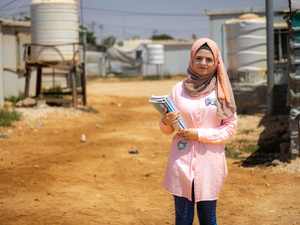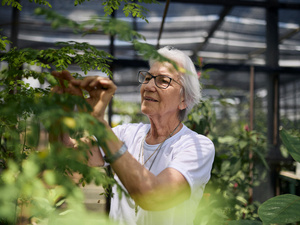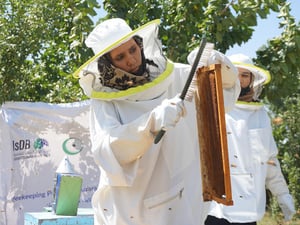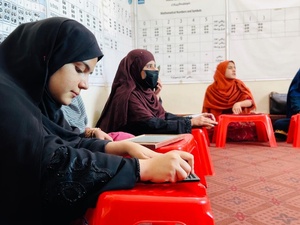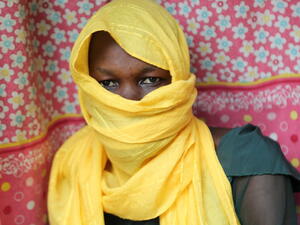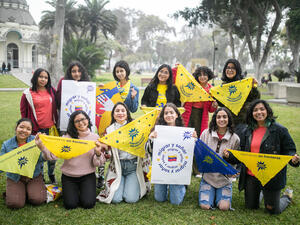UNHCR uses cinema to spread awareness of sexual violence
UNHCR uses cinema to spread awareness of sexual violence

Women at a settlement in Katanga province, where UNHCR has been raising awareness about sexual violence.
MOBA, Democratic Republic of the Congo, July 30 (UNHCR) - The cinema has come to this corner of the Democratic Republic of the Congo (DRC) for a couple of weeks, and locals are turning up in their droves to watch the nightly fare screened by the UN refugee agency.
The film they come to see has violence, drama, love and humour, but it is no Hollywood blockbuster. "Breaking the Silence" is about sexual violence and abuse of women - major problems in parts of eastern and south-eastern DRC, including South Kivu and Katanga provinces. Forcibly displaced women and girls are particularly vulnerable to abuse, and these are areas of high refugee return.
The film, which is aimed at combatting and raising awareness about the scourge, tells the stories of Congolese women and girls who have been raped, and of the physical and psychological scars they have suffered. The audience also hears from the men in their lives, husbands and fathers, who express emotions ranging from shame to depression.
"Breaking the Silence," which was produced by IF Productions of the Netherlands, also shows the challenges and difficulties that victims and their families face when seeking access to justice, despite the fact that a new national law on sexual violence was passed more than two years ago. Impunity remains a problem.
The mobile cinema is being organized by UNHCR implementing partner, Search for Common Ground (SFCG), a United States-based non-governmental organization that specializes in conflict resolution and conflict prevention. The cinema came to Katanga province last week after touring villages and towns in neighbouring South Kivu province, where an estimated 200,000 people saw the feature.
The first open-air showing of the film in Katanga was at the Mulolwa Stadium in Moba, a town on the west shore of Lake Tanganyika. An estimated 5,000 people, including UNHCR staff, attended the screening. A generator was used to power the projector.
The audience seemed rivetted by a film that explores a subject few people talk about openly here. There were moments of total silence during moving or shocking testimonies and outbreaks of laughter in lighter moments. Many people told UNHCR they were very impressed by the film and praised its educational value.
"These screenings stir people to examine the heavy burden weighing on the minds of the victims, call on perpetrators to end such practices, and urge the authorities to apply the law in an impartial manner," said one woman.
"The film also shows how men are affected by the rape of their wives and daughters. It's important that they be counselled too," added a young man. The mobile cinema will continue to tour the province until next Wednesday, helping to raise awareness about sexual violence among tens of thousands of people who normally have no access to audiovisual media.
Lena Slachmuijlder, head of SFCG's office in the DRC, explained why the programme was attracting so many people. "Mobile cinema is attention-grabbing and attractive, especially in areas like Moba where the people have few opportunities to watch television or films. The moving image is a particularly appropriate tool for tackling the taboos, stereotypes and general confusion surrounding the very definition of what constitutes rape," she said.
Assessments conducted after the screenings of "Breaking the Silence" in South Kivu indicate some improvement in the way men regard and treat women there as well as greater sympathy and understanding for the plight of victims of sexual violence.
According to United Nations figures, almost 3,500 women were raped by militiamen, soldiers or civilians in the eastern DRC in the first half of this year. "Given the taboo and stigma surrounding the issue, there are probably many other women who lacked the courage or the opportunity to report their rape," noted Barry Moon, head of the UNHCR office in Moba.

